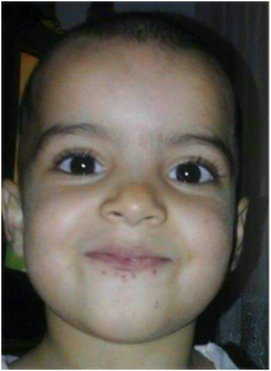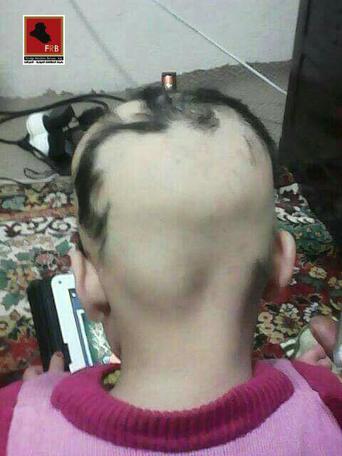Life in Iraq for 7 year-old Tabarak had never been normal, but things took a turn for the worse, two years ago, as battles broke out between government forces and the Islamic State (IS).
The barrel bombs which government helicopters rained down on Tabarak’s village in Dur, southern Tikrit - in October 2014 - destroyed not only her home, it also sent her into an irreversible state of shock.
Tabarak’s father, Abu Omar, also sustained life threatening injuries, after fragments of shrapnel perforated his skin, lodging themselves just centimeters away from his spinal cord
| Still, his greatest concern was his shellshocked daughter and how to reverse the psychological trauma she had suffered. The father of two described how after the family had survived the attack, Tabarak's hair started to fall out, triggering further psychological setbacks. “She’s afraid of people and has lost all self-confidence. She has become withdrawn unable to communicate with anyone” he woefully expressed. Government forces ordered barrel bomb attacks on the village where IS had embedded itself, back in 2014. Beneath this pretext however, government aircrafts routinely terrorise communities across towns and villages IS has infiltrated. Continued bombardment and lack of medical services, forced Abu Omar to relocate to neighbouring Al Alam with his family. They stayed there for a week, hoping to be seen by local doctors, but without running services, Abu Omar relocated to Mosul, another stop off, before escaping Iraq. “In Mosul, I was lucky to be seen by several doctors” he recalled, “but then came the bad news”. |
Abu Omar decided to make a move many Iraqis before him have made; that is to sell his car, and consider leaving the country “I had no other choice” he told FRB, “ to smuggle myself and my family out of Iraq, it had to be done”.
| As a modest agricultural family, neither Abu Omar, nor his wife and children held passports. As he described, “we never imagined having to flee”. The car fetched just enough to cover the cost of their journey to Turkey, but little more. On arrival to Ankara, the father approached the United Nations refugee agency, UNHCR, in search of medical assistance for himself and daughter. Yet their needs went unmet, as he went on to tell. “After we arrived to Turkey, I began visiting local hospitals, but without much money, I was refused treatment”. He still continued in his quest to find a solution, however, at the same time ignoring the advice given to him by doctors to lay off work to avoid the shrapnel moving closer to his spine. As he explained, his family needed a roof over their heads and food on the table”. Not working was not an option for Abu Omar. As for his daughter, he first needed to overcome a series of bureaucratic hurdles, before UNICEF agreed for his daughter to be seen by medical specialists. |
| Tabarak, who was only five at the time, was given an injection, high in hormones, to help restore her hair. Abu Omar told us that doctors had instead given her the wrong injection; causing severe hair growth across her entire body. “It was a mistake they told me, but offered no alternative”, he cried. In spite of the challenges Abu Omar was confronted by, he described his concerns for his daughter’s medical needs and family’s displacement, as more important than his own health issues. Abu Omar spoke of ‘invented’ accusations which the Iraqi state and elements from Iraq’s Popular Mobilization Forces had pinned on him. They claimed that the father of two was a supporter of the Islamic state (IS). According to Abu Omar, a member of the Hashed (who previously worked alongside US forces) “Sami Bermi Al Turkomani” posted on facebook an image of Abu Omar and friends helping Iraqi families to escape the carnage in Dur, on rubber dinghies, accusing him of helping IS fighters escape. “Even after I arrived with my family to Turkey, I received multiple phone calls from security personnel" he said. Police officer, Mohammad Ahmad Jaber called Abu Omar asking “why don’t you return back”. Abu Omar explained his situation, but the response from Jaber was aggressively hostile. |
All the while Abu Omar is stuck in Turkey, unable to return back home, neither himself nor his daughter have received adequate medical attention. He continues to wait in suspension; between asylum appointments and the hope for a better tomorrow.





 RSS Feed
RSS Feed